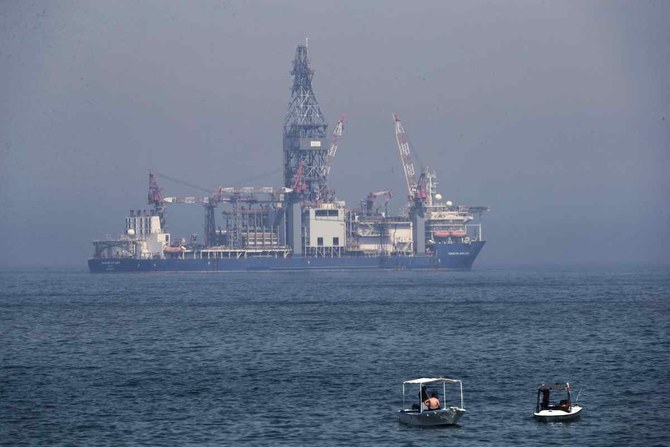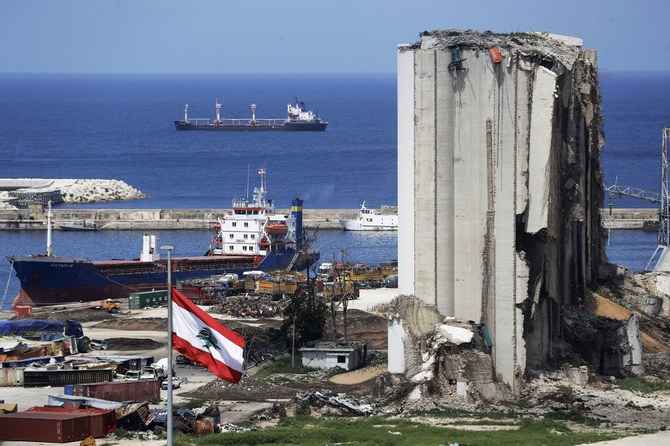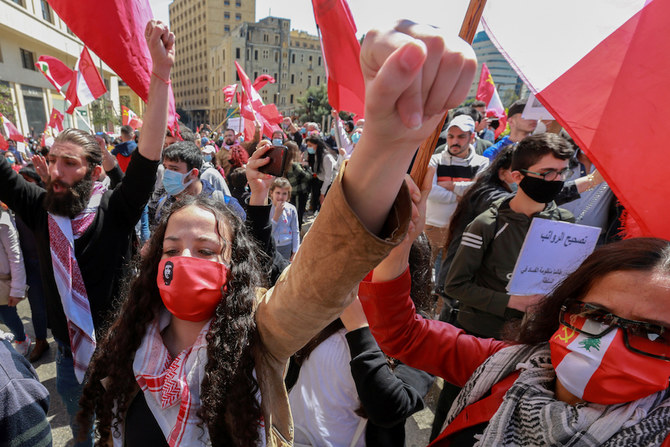برحيل العلامة السيد محمد حسن الأمين يخسر لبنان قامة وطنية عُرفت بنقاوة فكرها وانفتاحها تعازينا لعائلته الكريمة ولكل من عرفه ونهل من فكره المتنور

By DAVID ROMANO AND NAJIA HOUSSARI — arabnews.com — MISSOURI, USA/ BEIRUT: Syria has signed a four-year oil and gas exploration deal with a Russian company in Mediterranean waters that Lebanon claims as its own. The two blocks to be explored under the new contract overlap with Lebanese maritime areas for energy exploration along the country’s northern border. Yet Lebanese outrage has been conspicuous by its absence. Now imagine a time, not so long ago, when the shoe was on the other foot. Lebanon demarcated its maritime borders in 2011 and, three years later, offered tenders for oil and gas companies for Block No.1 in the north. Justifiably or not, Syria responded by not recognizing the Lebanese demarcation and lodging a protest. The striking contrast between the two reactions, separated by seven years, was not lost on the Lebanese opposition. “Where do the official Lebanese authorities stand on this issue?” asked Rola Tabsh, an MP from the Future Movement bloc, when Syria announced the contract last month. “What is this suspicious coma? We waited for the violation from the south, from the enemy (Israel), but it came from the north, from a brotherly country.”
Similar concern was voiced by Richard Kouyoumjian, former minister and serving member of the Lebanese Forces parliamentary bloc, who said: “The government and the relevant ministries are required to have a sovereign position and clear clarification.” He called for the “resumption of demarcation negotiations in the south, an end to Syrian complicity and plundering of our money and oil wealth.” In the south, Israel’s demarcation line conflicts with the Lebanese one, which has led to protracted indirect negotiations sponsored by the UN and mediated by the US. The Lebanese-Israeli dispute and negotiations have been ongoing for more than 10 years now. Hezbollah, being a pro-Iranian Shiite militia and political party, did not appear in favor of even indirect negotiations with Israel over the issue, but grudgingly acceded to them. A resolution to the maritime border dispute with Israel remains crucial to Lebanon’s ability to attract oil and gas companies to its waters.
حرية التعبير مقدسة ولكن الاعتداء على حرمة المنزل والملكية الفردية غير جائز كل التقدير للفنان اسعد رشدان
PARIS (Reuters) – French container shipping group CMA CGM is pursuing a plan to rebuild Beirut’s port within three years, despite political deadlock in Lebanon that has prevented decisions on the port since a blast last August, a company executive said. A chemical explosion at the port killed 200 people and destroyed entire neighbourhoods, deepening […]
كما الدولار ، يقفل كل اسبوع على رزمة مشاكل ليُفتتح الذي يليه بتجاذبات جديدة و يمضي الاقتصاد في الانهيار والشباب يهاجر حاملاً معه كفاءاته. المطلوب العودة فوراً الى الحوار في اي شكل من الاشكال انطلاقاً مما وصلت اليه هيئة الحوار الوطني والنظر في الصيغة العملية لتحييد لبنان ومناقشة جدول زمني قصير الامد للتخلّي عن السلاح […]

By NAJIA HOUSSARI — arabnews.com — BEIRUT: Arab League Assistant Secretary-General Hossam Zaki has called for “patience, political will and more communication” to break Lebanon’s political deadlock. Speaking on the second day of his visit to the crisis-wracked country, Zaki said that “everyone is still insisting on their positions” and that urgent action is needed to find a political solution. “The worst is yet to come, and action must be taken before it is too late,” he warned. Zaki’s visit was preceded by Egyptian Foreign Minister Sameh Shoukry’s arrival on Wednesday amid Arab efforts to help end the political impasse in Lebanon. The Arab League official voiced his support for Maronite Patriarch Bechara Boutros Al-Rai’s call for “a neutral Lebanon,” a plea that sparked an internal dispute in the country.
Following his meeting with Al-Rai, Zaki said the patriarch’s position “is in total harmony with the Arab League Council’s decisions regarding Lebanon’s self-distancing policy and keeping the country out of all regional conflicts.” During his meeting with Lebanese President Michel Aoun, Zaki asked about the fate of the Taif Agreement in light of political statements calling for the cancelation or amendment of the agreement for non-Lebanese interests. Shoukry’s agenda did not include meetings with the head of the Free Patriotic Movement Gebran Bassil or any Hezbollah officials, which prompted the excluded figures to describe the visit as “truncated.” All foreign initiatives to end the political deadlock in Lebanon have ended in failure. In his latest speech, Aoun focused on the need for a forensic financial audit of the Lebanese central bank instead of focusing on the formation of the government. The bank’s central council said on Friday that it had submitted an updated list of the documents requested by auditors Alvarez & Marsal to Finance Minister Ghazi Wazni. Wazni said later that he had delivered the list to the company.

By NAJIA HOUSSARI — arabnews.com — BEIRUT: While the official ministerial committee in Lebanon continues to ponder the allocation of ration cards to 800,000 families before lifting subsidies on basic goods, parties have rushed to absorb their supporters’ resentment. Hezbollah has issued ration cards for its supporters and partisans. “Alsajjad cards” enable their holders to get more than 50 percent off on food items, consumables, cleaning materials, and other goods from certain stores. The cards were severely criticized on social media by the party’s opponents. Other parties have relied on wealthy supporters to secure financial aid for the needy through their private foundations. Other politicians have bought vaccines to inoculate their families and supporters. The Free Patriotic Movement (FPM) told its supporters: “Difficult times are ahead, and chaos might prevail. We must remain patient and must not abandon our positions.”
The pressure has increased on non-partisan funds and associations, municipalities, and village committees to meet the needs of non-partisan people. Political parties are aware of the importance of keeping their communities under control as the decision to lift subsidies comes closer, which will almost certainly lead to anger and violent protests. Dr. Nasser Yassin, professor of policy and planning at the American University of Beirut, told Arab News: “When the economic collapse worsens, people start focusing on securing their biological needs: Food. And when food security becomes threatened, people might resort to any entity that can provide it. “This is when parties become a safety source, regardless of people’s convictions. Political leaders also become a safety net for these people and new funders might emerge to secure people’s needs in such circumstances.” He added: “However, this kind of security will not be enough to cover the needs when subsidies on basic items are lifted. No one can replace the state.”
By سجعان قزي — وزير سابق @AzziSejean
التأخّرُ في التأليفِ أَبْعدَ الحكومةَ العتيدةَ من مَهمّتِها الأساسيّةِ وهي إجراءُ الإصلاحات، وقَرّبَها من مَهمّةٍ أخرى هي مواكبةُ الاستحقاقِ الرئاسي. وبالتالي، التأخّرُ أضْعفَ فرصَ تشكيلِها من اختصاصيّين مستقلّين، وضاعفَ احتمالَ تَسْييسها. تسييسُ الحكومةِ يَتِمُّ باختيارِ اختصاصيّين مُحازبين أو تعيينِ سياسيّين. في موازينِ القِوى الحاليّ، التسييسُ يَعني سيطرةَ حزبِ الله وحلفائِه على الحكومةِ والتحكُّمَ، استطرادًا، باستحقاقَيْ الانتخاباتِ النيابيّةِ إجراءً أو إرجاءً، ورئاسةِ الجُمهوريّة انتخابًا أو شغورًا. لكنَّ الخروجَ عن مبدأِ حكومةِ الاختصاصيّين يَجعلُ الحكومةَ المقبِلةَ بحُكمِ “الـمُـلْغاة”(nulle et non avenue) ، إذ يُبقيها خارجَ رعايةِ المجتمعَين العربيِّ والدوليِّ، ويَستمرُّ حظرُ المساعداتِ، ويكونُ التأليفُ فِعلًا دستوريًّا تقنيًّا لا فعلًا إصلاحيًّا يؤثِّرُ على حياةِ الناس. المجتمعُ الدوليُّ والمؤسّساتُ النقديّةُ والدولُ المانحةُ تريد حكومةً للشعبِ اللبنانيِّ لا للطبقةِ السياسية.
اللافتُ أنَّ جميعَ القِوى السياسيّةِ في البلاد تتصرَّفُ كأنَ الانتخاباتِ النيابيّةَ والرئاسيّةَ غيرُ حاصلةٍ، والمجلسَ النيابيَّ الحاليَّ باقٍ بأكثريّتِه “الثماني آذارية”، والحكومةَ العتيدةَ أو الحاليّةَ المستقيلةَ ستقوم مقامَ الشرعيّةِ بعد انتهاءِ ولايةِ الرئيس ميشال عون. في حالِ تَشكّلت حكومةٌ جديدةٌ، تعيشُ البلادُ حالةَ شغورٍ رئاسيٍّ كَتِلك التي عَرَفتْها إثرَ انتهاءِ ولايةِ الرئيس ميشال سليمان. وفي حالِ بَقيَت حكومةُ تصريفِ الأعمال، تَسرحُ البلادُ في حالةِ فراغٍ دُستوريٍّ ـــ بل فراغٍ كاملٍ ـــ كتلك التي شَهِدَتها بعد انتهاءِ نظامِ المتصرفيّةِ ونشوءِ دولةِ لبنانَ الكبير. “واللبيبُ من الإشارةِ يَفهم”…
by reuters — By John Irish, Joseph Nasr, Ellen Francis PARIS/BERLIN/BEIRUT (Reuters) – Germany will next week present a multi-billion-dollar proposal to Lebanese authorities to rebuild the Port of Beirut as part of efforts to entice the country’s politicians to form a government capable of warding off financial collapse, two sources said. A chemical explosion at the port last August killed 200 people, injured thousands and destroyed entire neighbourhoods in the Lebanese capital, plunging the country deeper into its worst political and economic crisis since the 1975-1990 civil war. According to two diplomatic sources with knowledge of the plans, Germany and France are vying to lead reconstruction efforts.
Berlin will on April 7 outline its proposal, which the diplomats said would in principle include support from the European Investment Bank (EIB), to help fund the clearing of the area and reconstruction facilities. An EIB spokesman said it was aware of the proposal put forward by the port of Hamburg and its consultancy team for the reconstruction of the port of Beirut and surrounding areas. “However, there currently is no financing offer by the EIB. Any EIB financing would be subject to due diligence and have to follow the Bank’s usual processes for such operations,” he said.

by thearabweekly.com — PARIS – President Emmanuel Macron should freeze suspect assets held by Lebanese officials in France to break a “political-economic mafia” that has plunged Lebanon into crisis and misery, an open letter said Tuesday. Macron called for radical reform in Lebanon after the deadly Beirut port blast and has expressed exasperation at the lack of change, as the former French mandate territory remains mired in political stalemate. Analysts have said that sanctions such as asset freezes could be the most effective lever for Paris to pressure Beirut, even if France has so far not explicitly indicated it is ready for such a measure. Macron should issue instructions “with a view to implementing the legal mechanism for freezing assets of doubtful origin held in France by Lebanese political and economic leaders,” said the letter published in France’s Le Monde daily signed by more than 100 Lebanese civil society figures. It argued that a “political-economic mafia is responsible for the misery, hunger and insecurity from which more and more Lebanese suffer.”
The letter suggested that such a legal process should draw on the precedent set over ill-gotten assets owned in France by some African leaders and former Syrian vice president Rifaat Assad. “This endemic corruption on a grand scale has scandalously enriched Lebanese political leaders” by emptying the treasury and embezzling aid sent after the civil war, the letter alleged. It was signed by lawyers, doctors, journalists and activists, including prominent political scientist Karim Emile Bitar, former Lebanese culture minister and UN Libya envoy Ghassan Salame and former MP and TV host Paula Yacoubian.



